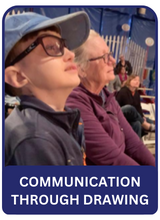“I know of no identified sub-group within the population of people with multi-sensory impairment who have so many medical problems, of such complexity and severity, and with so many hidden or delayed difficulties, and yet no sub-group has shown such a consistent ability to rise triumphantly above these problems”
– David Brown
Despite seemingly insurmountable obstacles, children with CHARGE syndrome often far surpass their medical, physical, educational, and social expectations. Parents of children with CHARGE are often heard talking about the indomitable spirit, the humor, and the compassion of their children. We share some of these stories here, as well as other stories about the journey of raising a son or daughter with CHARGE.
If you would like to submit a story, please click the button below:
Rare Disease Day Stories
Deafblind Awareness Week Stories
Children with CHARGE
Adults with CHARGE
Family Stories
Professionals and Caregivers









































